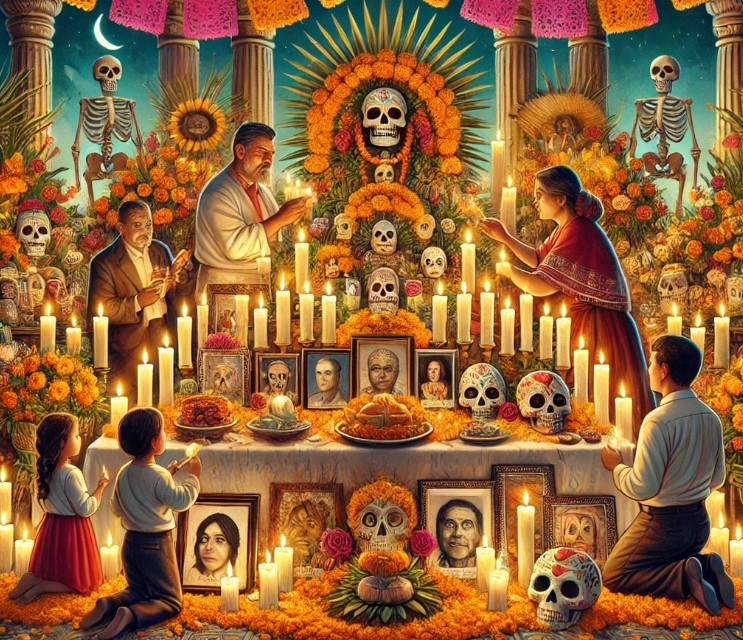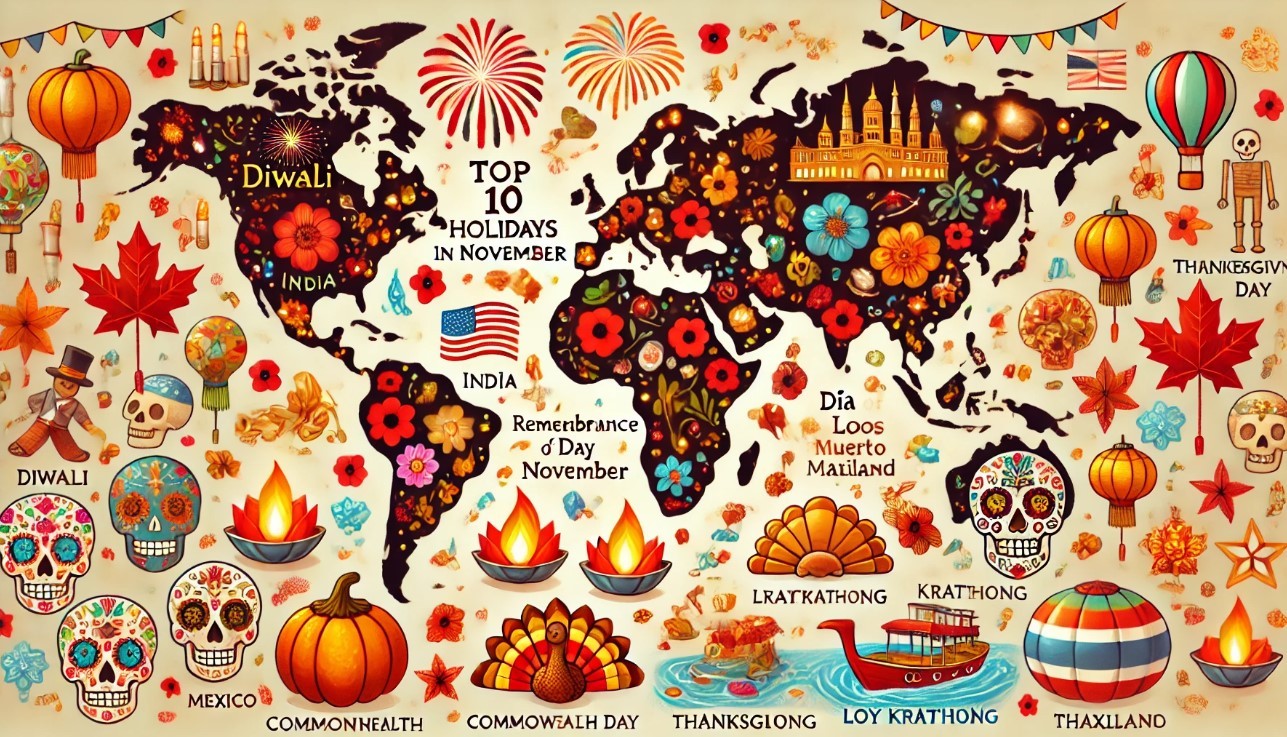All Souls' Day - Origin, Significance, Lessons, And Traditions Around The World
| Table of Contents |
It follows All Saints' Day and complements it by focusing not on the saints in heaven but on all deceased faithful, especially those believed to be in Purgatory. Through prayers, offerings, and rituals, believers offer spiritual support to these souls, aiding them in their journey toward eternal peace in Heaven.
Unlike All Saints' Day, which honors those whose sanctity has already been recognized, All Souls’ Day invites a more personal reflection on family members, friends, and loved ones who have passed away. The day has evolved into a culturally rich occasion observed worldwide, blending Christian beliefs with local customs. Whether through quiet prayers, lighting candles, or vibrant festivals, people globally embrace this day as a time to remember, honor, and support their departed loved ones.
Lean more: All Saints' Day - Origin, Meaning, Traditions, and Celebrations Around the World
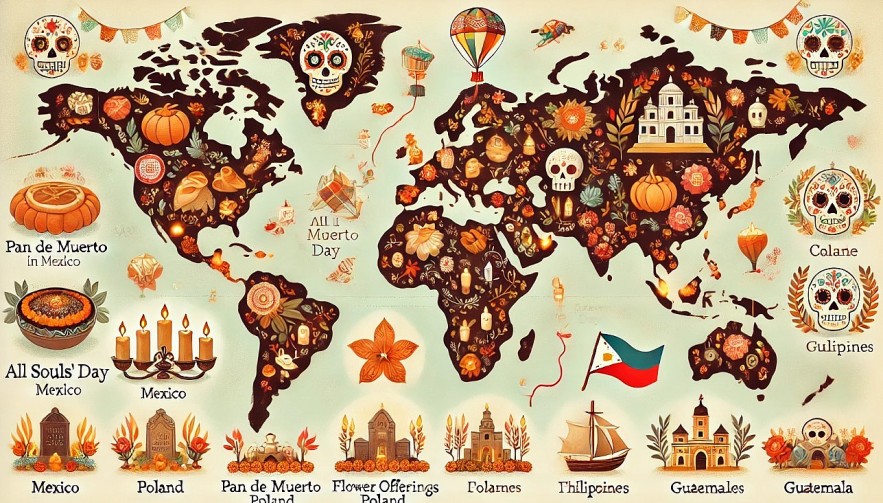 |
| A world map showing All Souls' Day traditions, with icons representing customs like pan de muerto in Mexico, colorful candles in Poland, grave decorations in the Philippines, and a kite in Guatemala |
Origins and Historical Background
Christian theology and ancient rituals honoring the dead have long been intertwined in the history of All Souls' Day. Praying for the departed was a common practice among believers in the early Christian Church, where it originated. These prayers were considered acts of kindness, intended to ease the soul's journey to paradise. A historical overview of All Souls' Day is presented here:
Early Christian Beginnings: From as early as the second century, Christians held the belief that the living could aid the deceased through prayer. Early inscriptions found in Roman catacombs reveal requests for prayers for the dead, indicating that early Christians felt a sense of duty to care for departed souls. The tradition became more structured over time, as prayers and rituals for the dead were incorporated into the Church’s formal practices.
Formalization in the Middle Ages: The observance of a specific day for all souls is often credited to St. Odilo, the abbot of Cluny in France. In 998 AD, he established November 2nd as a day of remembrance for all departed souls within his monastery. The practice spread through the Benedictine monasteries and eventually became a universal observance within the Catholic Church, formally recognizing All Souls' Day as a day of prayer for the deceased.
Development of Doctrines of Purgatory: The medieval period saw the development of Purgatory as a theological concept, formalized in the Catholic Church. According to this doctrine, Purgatory is a place or state of purification where souls undergo cleansing before entering Heaven. This understanding reinforced the significance of prayers for the dead, as believers felt that their prayers could reduce the time souls spent in Purgatory.
Influence of Pagan Festivals: Before Christianity, many cultures had rituals to honor the dead. The ancient Romans, for example, held the Parentalia festival, which was a nine-day celebration dedicated to deceased family members. The Celts celebrated Samhain, a time when the boundary between the living and the dead was believed to thin, allowing for spiritual connection. As Christianity spread, the Church often integrated these local traditions into Christian practices, and some of these influences shaped how All Souls' Day was observed.
All Souls' Day, therefore, combines Christian principles with a universal desire to honor loved ones who have passed, creating a day rich in tradition and meaning.
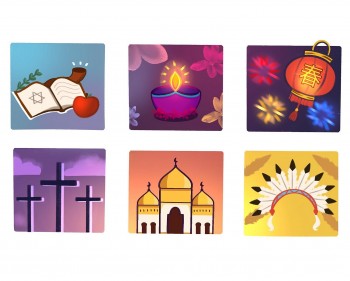 Top 20 Major Religious Holidays Worldwide 2025: Origins, Significances, and Celebrations Top 20 Major Religious Holidays Worldwide 2025: Origins, Significances, and Celebrations |
The Meaning of All Souls’ Day
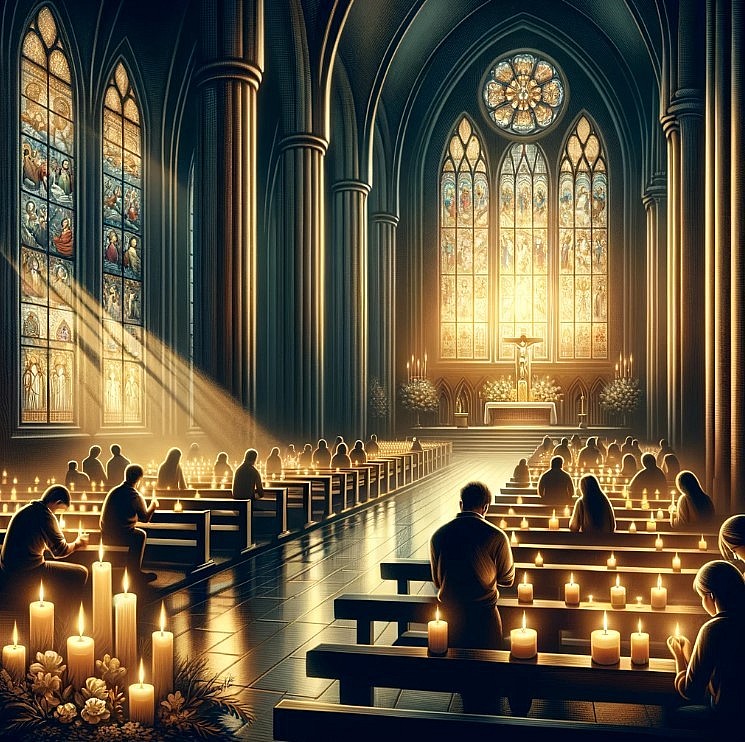 |
| A serene church interior with people praying, lighting candles, and reflecting quietly, capturing the solemn and spiritual ambiance of All Souls' Day |
All Souls’ Day holds a special place in Christian doctrine and practice, representing a day of compassion, reflection, and intercessory prayer. It emphasizes the importance of spiritual solidarity and highlights the bonds that unite the living and the deceased in a shared journey of faith.
Spiritual Purpose: The main purpose of All Souls’ Day is to offer prayers for the souls of those who have passed, particularly for those who may not yet have attained the purity required to enter Heaven. This belief stems from the Catholic doctrine of Purgatory, where souls are purified of their earthly sins. Through prayers, Masses, and acts of devotion, the living offer spiritual support, hoping to aid these souls in their journey toward eternal peace.
Catholic Belief and Doctrine: Within the Catholic Church, All Souls’ Day is an important occasion that brings attention to the concept of “communion of saints,” a belief that the faithful on earth can assist the souls in Purgatory through intercessory prayer. Catholics often attend special Masses on this day, lighting candles, and offering personal prayers for deceased family members and friends.
Protestant and Orthodox Views: While Protestant denominations may not uphold the doctrine of Purgatory, many still observe All Souls’ Day as a time to honor and remember loved ones. Anglican and Lutheran churches, for example, hold services and prayers for the departed, though they focus more on remembrance rather than intercessory prayers. The Eastern Orthodox Church, which celebrates a similar event called “Saturday of Souls,” offers prayers and memorials for the deceased, underscoring the unity of the living and the dead within the faith.
All Souls’ Day reminds believers of their role in supporting one another through life, death, and beyond, emphasizing that faith transcends even mortality.
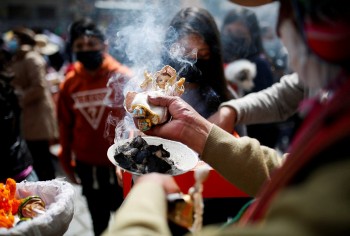 2025 Religious Holidays in the US: Dates, Significance, and Celebrations 2025 Religious Holidays in the US: Dates, Significance, and Celebrations |
Traditions and Customs Around the World
All Souls’ Day is celebrated in diverse ways around the world, with each culture infusing its own unique customs and traditions into the observance. Here’s how some regions honor this sacred day:
-
Europe:
- Italy: Italians visit cemeteries on All Souls' Day, lighting candles on the graves of loved ones and offering flowers. A common treat is Ossa dei Morti, or “bones of the dead,” almond-flavored cookies that serve as a reminder of the departed.
- Poland and Hungary: In Poland, families gather in cemeteries to light candles and place flowers on graves. The glow from the candles creates a powerful scene as families pray for their ancestors. In Hungary, people observe Halottak Napja (Day of the Dead) with similar rituals, honoring the souls with prayers and candlelit vigils.
- Spain: Spanish people often visit cemeteries on All Souls’ Day, gathering to remember loved ones and pray. They decorate graves with flowers, and some regions hold community gatherings where families share stories about their deceased relatives.
-
Latin America:
- Mexico: The final day of Día de los Muertos falls on All Souls’ Day, marking the time to honor all departed souls, especially those who might not have been remembered on All Saints' Day. Families create elaborate altars with offerings of food, flowers, and mementos, celebrating with music and vibrant decorations.
- Guatemala and Ecuador: In Guatemala, All Souls’ Day is marked by the colorful tradition of kite flying, where giant kites are believed to communicate with the spirits. Ecuadorians bake and share a special bread called guaguas de pan in memory of their loved ones.
-
Asia:
- Philippines: Known as Araw ng mga Patay (Day of the Dead), All Souls' Day in the Philippines is a major family event. Families gather to clean and decorate graves, lighting candles and sharing food. Some families even camp out at cemeteries overnight to celebrate together.
- Japan: While All Souls’ Day is less common, Japanese Christians may integrate customs from Obon, a traditional Buddhist festival where families honor their ancestors by lighting lanterns and visiting graves.
-
Africa:
- Madagascar: The Malagasy people celebrate the Famadihana, a ceremony in which families re-wrap the bones of ancestors, dancing and feasting in their honor. While not identical to All Souls’ Day, it shares a similar theme of family remembrance.
- Nigeria: Nigerian Catholics observe All Souls' Day by attending Mass and praying for the departed, often blending traditional rites with the observance to create a unique celebration.
Each of these customs reflects the universal desire to remember, honor, and connect with the departed, underscoring the cultural richness of All Souls’ Day around the world.
 November Holidays and Observances for Every Year November Holidays and Observances for Every Year November is a month full of international holidays, including Thanksgiving, Hug a Beer Day, Diwali, All Saints Day, and many more monthly, weekly, and daily ... |
Significance and Lessons from All Souls' Day
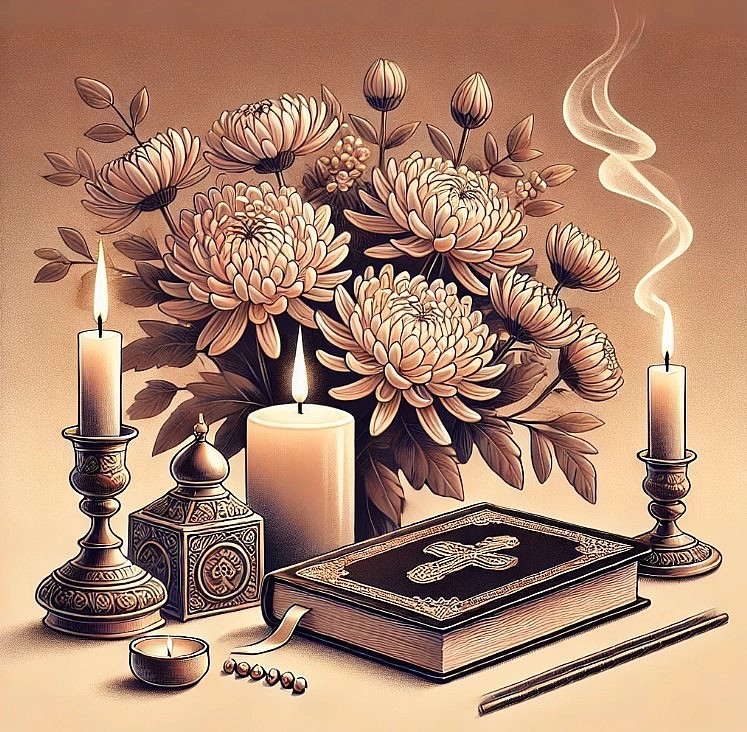 |
| The illustration featuring close-up symbols associated with All Souls' Day |
All Souls' Day offers profound spiritual and ethical insights, encouraging reflection on life, death, and legacy. Observing this day helps people connect across generations, honoring those who came before while considering the impact they themselves may leave behind. Here are some key lessons and aspects of significance that All Souls' Day imparts:
Moral and Ethical Reflections: All Souls' Day emphasizes compassion and intercessory prayer for the deceased. For those who believe, it serves as a reminder of the power of prayer and mercy, reinforcing the notion that humans are interconnected, even beyond life. Reflecting on the departed encourages believers to think about how they are living their own lives and what they may leave behind. This focus on moral integrity and legacy provides an opportunity for self-assessment and personal growth.
Family and Cultural Connections: The day brings families together, creating a space for shared memories, storytelling, and honoring those who have passed. Through All Souls' Day, families strengthen bonds as they gather in cemeteries, light candles, and engage in rituals that honor their collective past. These gatherings foster unity, reminding each generation of their heritage and shared values. Across cultures, the rituals may vary, but the shared intention of remembrance builds connections within families and communities, enriching cultural continuity.
A Reminder of Mortality: All Souls' Day also invites people to confront the reality of mortality. In many societies, discussions around death and the afterlife are minimized, but All Souls' Day provides a structured, respectful space for these reflections. By acknowledging that death is a natural part of the human experience, people are encouraged to live with intentionality, kindness, and faith. The day promotes a sense of peace and acceptance, encouraging people to cherish their loved ones and to live in a way that aligns with their values.
In essence, All Souls' Day serves as a timeless reminder that life is precious and that actions and values resonate beyond one’s lifetime. It inspires individuals to honor their loved ones, embrace compassion, and find purpose in their own lives. Through acts of remembrance, people can find comfort, closure, and hope, celebrating the enduring connection between the living and the deceased.
Conclusion
Christians and those who observe All Souls' Day value it greatly. This day of remembrance helps believers feel closer to their deceased loved ones through prayer, reflection, and rituals. It complements All Saints' Day by offering a day for personal reflection and honoring all souls, especially those still seeking peace.
Beyond its spiritual aspects, All Souls' Day strengthens family and community bonds by encouraging reflection on inherited values and traditions. In a busy world, the day's focus on prayer, remembrance, and introspection provides continuity and peace. All Souls' Day reminds us of our universality through quiet reflection, community gatherings, or vibrant cultural rituals.
All Souls' Day honors the dead and helps us understand life's mysteries. It encourages believers to be compassionate, value others, and embrace humanity's journey. Remembrance helps people connect with the past, celebrate the present, and hope for a future of love and faith.
Frequently Asked Questions (FAQ)
-
What is the main difference between All Souls' Day and All Saints' Day?
- All Saints' Day, observed on November 1, honors all saints who have entered Heaven and are venerated as holy figures. All Souls' Day, on November 2, is dedicated to praying for all deceased faithful, especially those believed to be in Purgatory. While All Saints' Day celebrates the lives of canonized saints, All Souls' Day is focused on the departed, particularly those who may still need prayers.
-
Why do people pray for the dead on All Souls' Day?
- Many Christians, particularly Catholics, believe that praying for the dead helps their souls in the afterlife, especially those in Purgatory, as they undergo purification. Prayers, Masses, and acts of devotion are offered to assist these souls on their journey to Heaven. This practice is seen as an act of mercy, reinforcing the belief in the power of prayer to aid the departed.
-
How is All Souls’ Day observed in various Christian denominations?
- All Souls' Day is widely observed by Catholics, who often attend Mass and visit cemeteries to pray for their deceased loved ones. Some Protestant denominations, such as Anglicans and Lutherans, also observe the day with prayers and memorials, though without the Catholic focus on Purgatory. In the Orthodox Church, similar observances are held on designated "Saturdays of Souls," though not on November 2.
-
Is All Souls’ Day a public holiday anywhere?
- All Souls’ Day is a public holiday in several countries with large Catholic populations, including Brazil, Mexico, and the Philippines. In these countries, families often travel to cemeteries and spend the day cleaning graves, lighting candles, and praying for their deceased relatives.
-
Are there specific symbols associated with All Souls' Day?
- Common symbols for All Souls' Day include candles, which represent light and hope for the souls of the departed, and flowers, which are used to decorate graves as symbols of respect and remembrance. In some cultures, food offerings, incense, and special breads (such as Mexico’s pan de muerto) are also common. These symbols reflect the reverence and care people show for the deceased on this day.
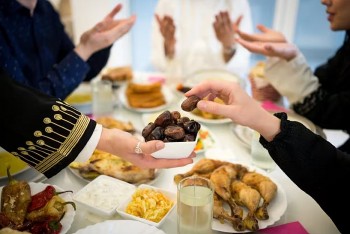 Religious Holidays in Australia 2025: Date, Significance, and Celebrations Religious Holidays in Australia 2025: Date, Significance, and Celebrations KnowInsiders will provide an overview of key religious holidays, their historical background, significance, and how they are celebrated across Australia. |
 Religious Holidays in the UK in 2025: Dates, Significances, and Celebrations Religious Holidays in the UK in 2025: Dates, Significances, and Celebrations This article will discuss the major UK religious holidays in 2025, including their history, significance, celebration, and status as public holidays or observances. We'll also ... |
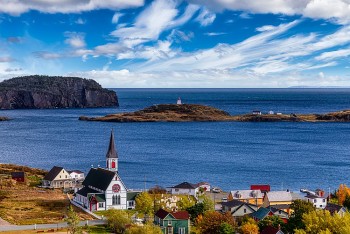 Religious Holidays in Canada 2025: Origins, Significances, Celebrations, and Closures Religious Holidays in Canada 2025: Origins, Significances, Celebrations, and Closures KnowInsiders outlines the key religious holidays in Canada in 2025, their origins, significance, common celebratory activities, and whether schools and offices close during these observances. |

